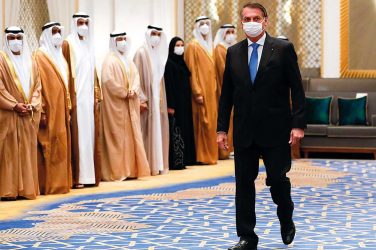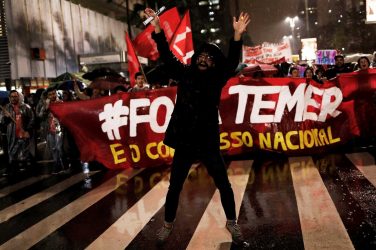Brazil’s president, Michel Temer, is facing a major scandal over a tape purporting to show him condoning bribery and efforts to influence public officials. It’s another in a long series of interconnected public and corporate scandals that’s engulfed the Brazilian elite in recent years. Pedro Dutra Salgado explains a web of events.
Who is Michel Temer?
Temer belongs to Brazil’s Democratic Movement Party (PMDB). He was elected as Dilma Rousseff’s vice-president in 2014 and took charge of the country after she was impeached and ousted by parliament in 2016. Since then he has proposed a series of harsh austerity “reforms”, slashing social security programs and workers’ rights.
What’s this latest scandal?
On May 17, a recorded conversation was handed over to investigators as part of a plea bargain with Joesley Batista, a businessman involved in corruption investigations, and then made public.
On the tape, Temer is seemingly told that one of his allies who was arrested for corruption, former head of the Chamber of Deputies, the PMDB’s Eduardo Cunha, was being paid monthly bribes. (Cunha is currently in jail for money laundering and tax evasion).
To that, Temer replies: “You have to keep this going, OK?” In the same conversation, Batista also claims he can influence the decision of two judges and a federal prosecutor, to which Temer says: “Great, great.”
While not denying that his voice is heard on the tape, Temer’s lawyers claim it was heavily edited. But the impact of what’s been reported is nonetheless enormous; they imply that at the very least the president was aware of bribes and obstructions to ongoing corruption investigations. In his plea bargain deal, Batista also alleged that he illegally paid almost 2,000 politicians – Temer among them – a total of 500 million reais (US$ 150 million).
How does this relate to other scandals?
Batista is being investigated as part of “Operation Car Wash”, a massive investigation into bribery and illegal campaign financing that touches on some public companies (notably Petrobras) and many private ones. For its part in these practices Batista’s company, the meat distributor JBS, will probably be hit with a heavy fine, expected to be in the region of 11 billion reais (US$ 3.4 billion).
If confirmed, that fine will be second only to the fine construction company Odebrecht SA was slapped with in April 2017 by the governments of Brazil, Switzerland and the US. But for all that the fines are colossal, the plea bargain deals under which they’re issued mean the companies can still bid for public contracts.
How might this affect Temer’s government?
Given that it began with what amounted to a congressional coup against Rousseff, Temer’s presidency was always going to be fragile. He himself concedes he is very unpopular, and that his government depends on the support of congress and the media.
The day after the tape was released, the Federal Supreme Court authorized an investigation against Temer and impeachment requests were presented to the Chamber of Deputies.
The president responded with a speech declaring he had no intention of resigning, but some of his ministers have resigned, while various newspapers in Brazil are demanding he resign or face impeachment.
With all this public pressure, Temer will struggle to maintain the congressional support he needs to hold his government together – and in an apparent attempt to clear his name and thereby alleviate some of the pressure, he is now asking the Supreme Court to investigate him.
Since Temer was actually caught on tape apparently condoning and encouraging bribery, corruption and obstruction of justice, the case for impeachment is rather tighter than it was when Rousseff was dethroned.
Temer is also even more politically isolated than his predecessor was. Unlike Rousseff’s Workers’ Party (PT), which enjoys the loyalty of various social movements and powerful trade unions, the PMDB exerts power solely via its presence in congress, meaning its elected officials are more vulnerable to scrutiny by the mainstream media. If they want to remain the largest party in congress, the PMDB’s representatives might just have to turn against their own president.
What about charges against other politicians?
Besides Temer, Batista’s recordings also spell trouble for the senator Aécio Neves, whom Batista caught on tape accusing members of the government of being “too weak” to stop corruption investigations, as well as asking for 2 millions reais (US$ 611,000) in bribes.
Rousseff’s presidential predecessor, Luiz Inácio Lula da Silva, already faces multiple corruption charges, and was in the last few days formally charged in an even more serious corruption probe.
Both he and Rousseff have been mentioned in various plea bargains made in the Car Wash investigation, and there have been some reports that both judges and the media have been pressing defendants to mention the former presidents.
Other members of the PT have been embarrassed by revelations that emerged from recent plea bargains between prosecutors and executives, especially the former finance minister Guido Mantega, though concrete proof of wrongdoing has yet to emerge.
What now?
People were protesting against Temer even before the tape emerged, and the recordings have only galvanized public opinion against him. Impeachment proceedings might well be on the horizon; even if Temer isn’t impeached, the 2014 election that elected him and Rousseff may yet be voided because of alleged campaign financing irregularities. These allegations will be heard in court at the beginning of June.
Should Temer be removed from office, the presidency would go to the next eligible person in the line of succession. That would normally be the head of the Chamber of Deputies, but the current one, Rodrigo Maia, is facing a corruption inquiry of his own, which might legally exclude him from the presidency. Next in line is the Senate’s president, then the president of the Supreme Court.
Whoever ultimately takes office would have 30 days to call an “indirect election”, a process in which a new president would be elected by congress rather than the public, then remain in office until the 2018 general election.
This would be highly controversial. Many Brazilians feel that the current scandal-riven congress should not be tasked with electing a new president, and an indirect presidential election would feel uncomfortably like a return to dark undemocratic times. People have been claiming for a direct election using a popular slogan from the late 1980s: “Diretas já.”
There is now broad support for a proposed constitutional amendment that would require any successor to Temer to immediately call a direct election, so that the next president would be chosen by the people, not politicians – who currently enjoy less public support than ever.
Pedro Dutra Salgado is a PhD Candidate in International Relations, at the University of Sussex. He receives funding from the Brazilian National Council for Scientific and Technological Development (CNPq).
This article was originally published in The Conversation. Read the original article here: http://theconversation.com/qanda-brazils-latest-presidential-corruption-scandal-78144










